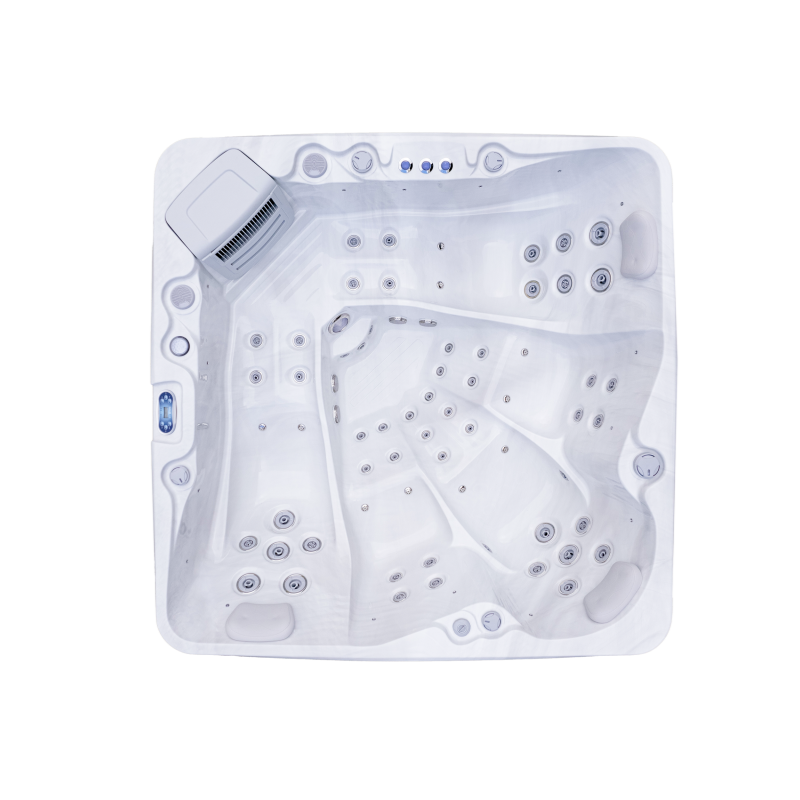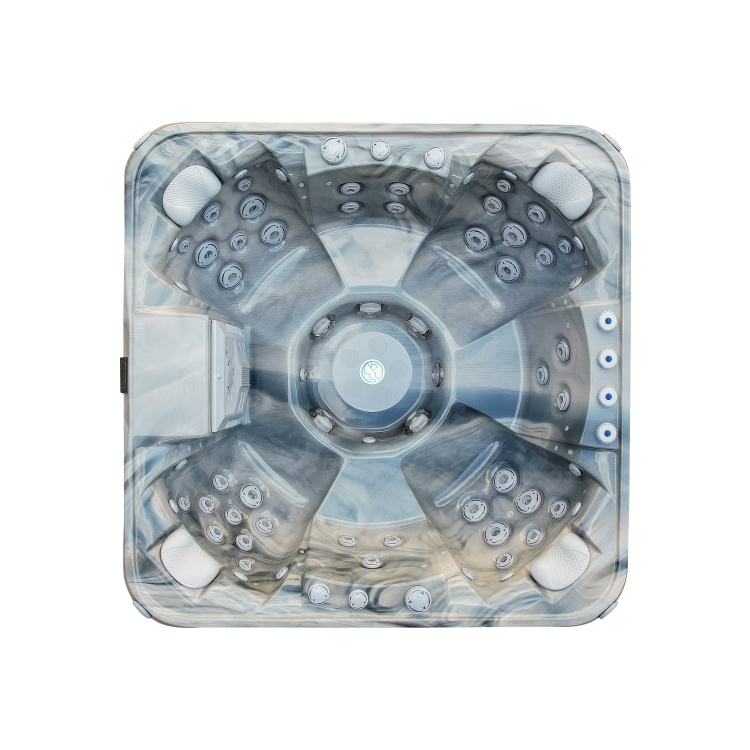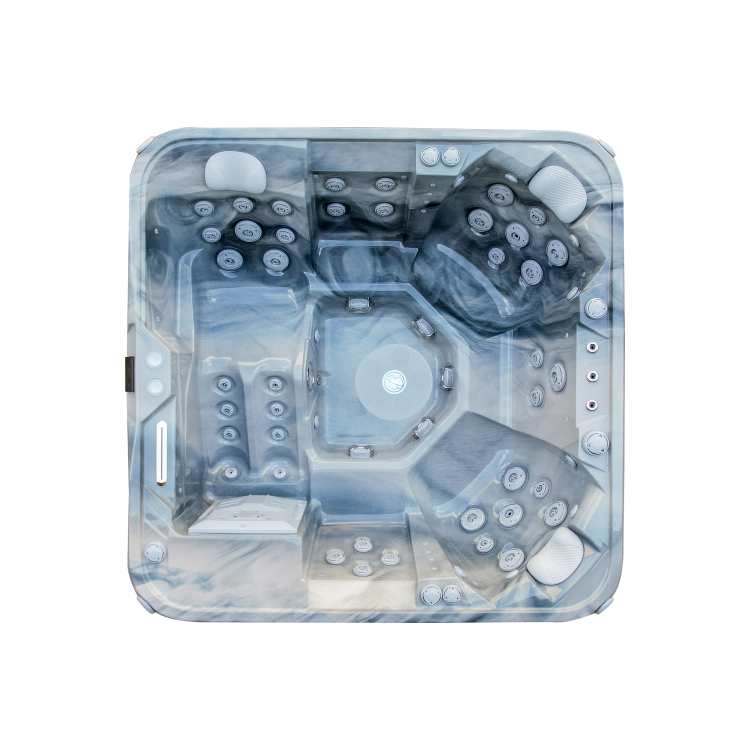An outdoor spa jacuzzi bathtub is not only a great place to relax, but also an important leisure facility in many people's homes. However, like all water quality systems, hot tub water quality management is also crucial, especially water hardness. Water hardness, which generally refers to the concentration of calcium (Ca²⁺) and magnesium (Mg²⁺) ions dissolved in water, directly affects the water quality of the bathtub, the maintenance of the equipment, and the user experience.
If the water hardness is too high, it may cause scale accumulation, affecting the efficiency of water flow and heating systems; while if the water hardness is too low, it may cause water to become more corrosive and damage the bathtub and pipes. How to adjust the water hardness in an outdoor spa jacuzzi bathtub is a skill that every bathtub owner needs to master.
This article will discuss in detail the impact of water hardness on outdoor spa jacuzzi bathtubs, how to detect water hardness, how to adjust water hardness, and what to pay attention to when adjusting water hardness, to help users effectively maintain the water quality of the bathtub and extend the life of the equipment.
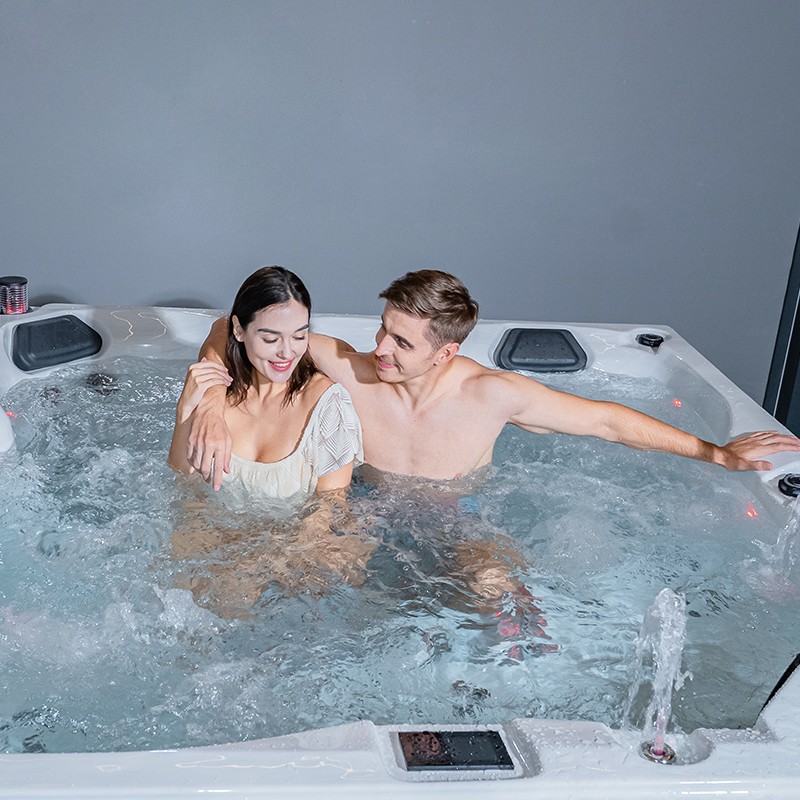
The impact of water hardness on outdoor spa jacuzzi bathtub
1. Definition and importance of water hardness
Water hardness refers to the concentration of calcium and magnesium ions in water, usually expressed in "ppm" (parts per million) or "mg/L" (milligrams per liter). According to the degree of water hardness, water can be divided into two types: soft water and hard water.
● Hard water: The concentration of calcium and magnesium ions in water is higher, usually greater than 120 mg/L.
● Soft water: The concentration of calcium and magnesium ions in water is lower, usually less than 60 mg/L.
The impact of water hardness on outdoor spa jacuzzi bathtub is mainly reflected in the following aspects:
● Scale accumulation: The calcium and magnesium ions in hard water easily react with substances such as carbonate in water to form scale, especially in hot water environment. The accumulation of scale not only affects the efficiency of water flow and heating system, but also causes pipe blockage and may even cause damage to the heating element of outdoor spa jacuzzi bathtub.
● Equipment corrosion: Soft water has fewer dissolved minerals, but it is more corrosive. Long-term use of soft water may cause corrosion to metal parts of equipment such as bathtubs, pipes and heaters, affecting the life of the equipment.
● Unclear water quality: When the water hardness is too high, mineral deposits in the water may cause turbidity in the water, affecting the clarity of the bathtub water and reducing the user experience.
2. The impact of high hardness water
The biggest problem with using hard water is the accumulation of scale. Scale not only affects the performance of the spa jacuzzi bathtub and the water flow system, but may also cause the efficiency of the heating system to decrease. Due to the high water temperature in the hot tub, scale is easy to form on the heating element, causing poor heat conduction, increasing energy consumption and shortening the life of the equipment. Scale accumulation in the heater may also cause equipment failure and increase maintenance costs.
Another problem with hard water is that the accumulation of scale may block the filter and water pump, reduce the efficiency of water circulation, and thus affect the cleanliness of the water quality and the smoothness of the water flow. Long-term failure to clean the scale may cause the entire water circulation system of the outdoor spa jacuzzi bathtub to not work properly.
3. The impact of low hardness water
Although soft water does not produce scale, it is highly corrosive. Soft water has a lower mineral content, so it tends to "extract" metal components from equipment more easily, causing corrosion of metal parts such as pipes, spa jacuzzi bathtub surfaces, and heaters, which may accelerate the aging of equipment. Soft water is particularly corrosive in high temperature environments.
In addition, soft water may cause the surface of the bathtub to become sticky, which makes cleaning and maintenance difficult. The surface of a spa jacuzzi bathtub using soft water may accumulate more stains and grease, which are difficult to remove and affect the user experience.
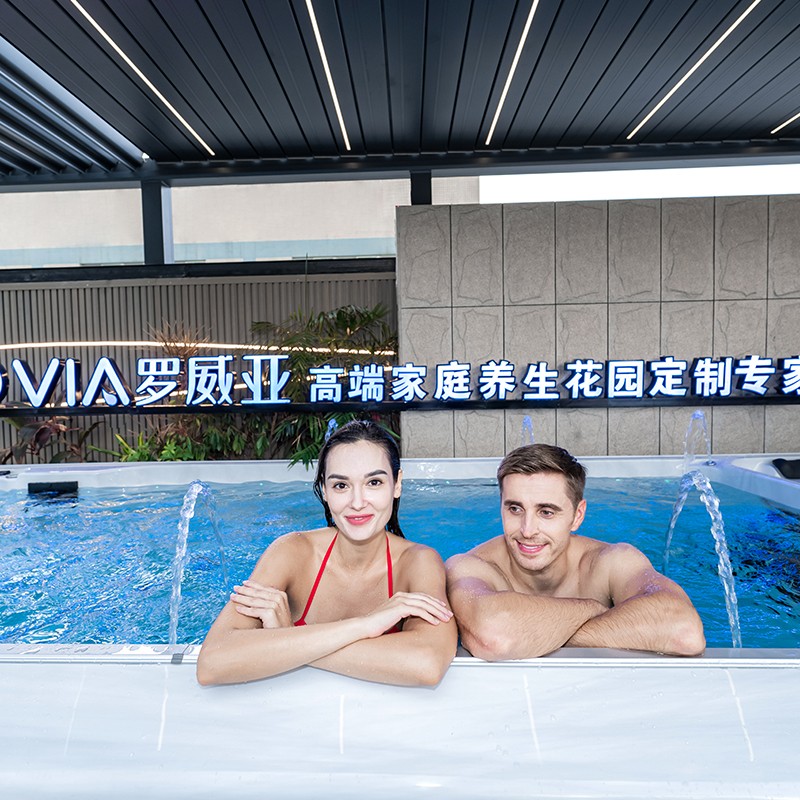
How to detect the water hardness of an outdoor spa jacuzzi bathtub?
To adjust the water hardness in an outdoor spa jacuzzi bathtub, you first need to determine the hardness of the current water quality. There are usually several ways to detect water hardness:
1. Use a water hardness test kit
Water hardness test kits are a common and simple method for home users to test water quality. These kits usually contain liquid reagents or test strips that can react with the water sample and change color to show the hardness of the water. Here's how to use it:
● Take a small bottle of bathtub water sample.
● Add the reagent or test strip to the water sample according to the instructions.
● Compare the test results based on the color change or the reaction of the reagent to get the water hardness value. Common units are ppm or mg/L.
The advantage of this method is that it is simple to operate and inexpensive, but its accuracy is slightly lower than laboratory testing.
2. Use a digital water quality tester
For more precise measurements, digital water quality testers are a more advanced option. These devices detect the concentration of calcium and magnesium ions in the water through electronic sensors and can give accurate water hardness values. The advantages of digital water quality testers are their high accuracy and fast response, but they are usually more expensive.
3. Laboratory testing
If users want to get the most accurate water hardness data, laboratory testing is the most professional method. Users can send water samples to a water quality testing laboratory for detailed chemical analysis. Although this method is very accurate, it takes a long time and is expensive, and is usually not suitable for daily use in ordinary households.
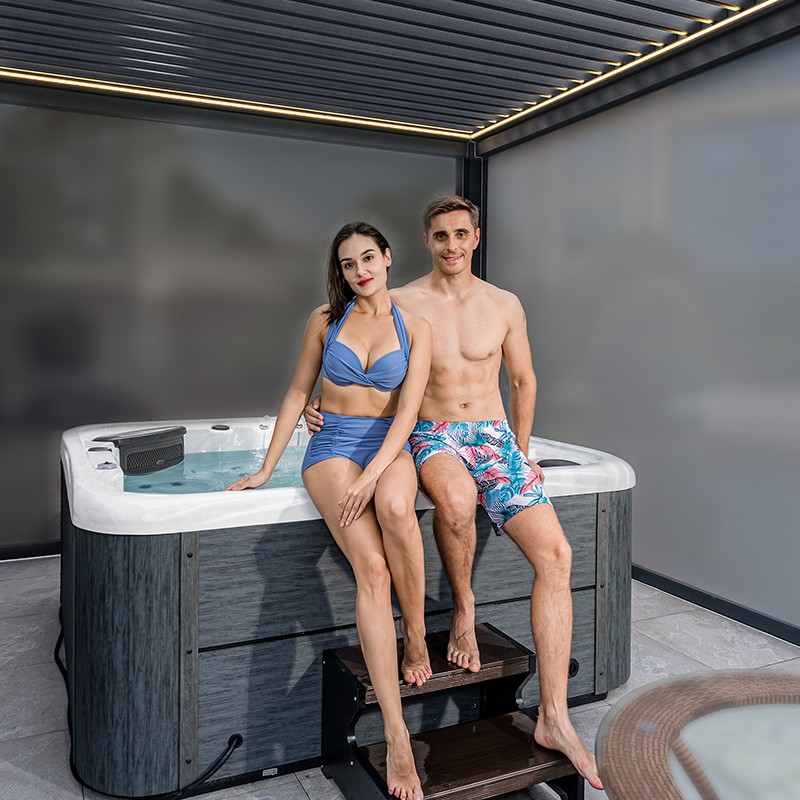
How to adjust the water hardness of outdoor spa jacuzzi bathtub?
After understanding the water hardness, the next step is to adjust the water hardness of outdoor spa jacuzzi bathtub to the ideal range. Depending on the specific value of the water hardness, the adjustment method varies. Generally speaking, the ideal water hardness should be around 150 ppm. Too low or too high a hardness is not good for the health of the equipment and water quality.
1. Adjust the situation of excessive water hardness
When the water hardness of the outdoor spa jacuzzi bathtub is too high, the most common problem is the accumulation of scale. In order to reduce the formation of scale, you can take the following methods:
● Use water softener: Water softener is a common product to solve the problem of hard water. It replaces calcium and magnesium ions in water with sodium ions through chemical reactions, thereby reducing the hardness of water. There are many types of water softeners on the market, including granular, liquid and easy-to-install water softening devices.
● Use water stabilizer: Some water stabilizers can change the chemical properties of water without removing minerals from the water, thereby reducing the deposition of scale. These stabilizers can effectively inhibit mineral deposition and prevent scale formation.
● Regularly clean the water circulation system: Regularly cleaning the water circulation system of the outdoor spa jacuzzi bathtub, especially the heater and water pump, can remove the scale that has already formed. Using a special descaling agent can help dissolve the scale deposited on the heating element and restore heating efficiency.
2. Adjust the situation where the water hardness is too low
If the water hardness of the outdoor spa jacuzzi bathtub is too low, the corrosiveness of the water may increase, causing damage to the bathtub and equipment. To this end, the following methods can help increase the hardness of the water:
● Add water hardness enhancers: There are special water hardness enhancers on the market that can be added directly to the water of the bathtub to increase the concentration of calcium and magnesium ions in the water. By adjusting the hardness of the water to the ideal range. Usually, water hardness enhancers exist in powder or liquid form and are used according to the instructions.
● Use mineral salts: Some outdoor spa jacuzzi bathtubs use mineral salts to adjust the water quality, especially calcium or magnesium salts. By adding these minerals to the water, the hardness of the water can be effectively increased and the corrosiveness of the water can be prevented.
● Control the water source: If possible, consider adjusting the water source used. The tap water source in some places is naturally soft, and you can consider increasing the hardness of the water by installing appropriate water treatment equipment (such as mineral filters).
3. Maintain stable water quality and hardness
The adjustment of outdoor spa jacuzzi bathtub water hardness is not a one-time job, it requires regular inspection and timely adjustment. In order to ensure the continuous stability of water quality, it is recommended to test the water hardness regularly and adjust the water treatment method as needed. By using water softeners and water hardness enhancers properly, it can ensure that the water quality remains at a healthy level for a long time.
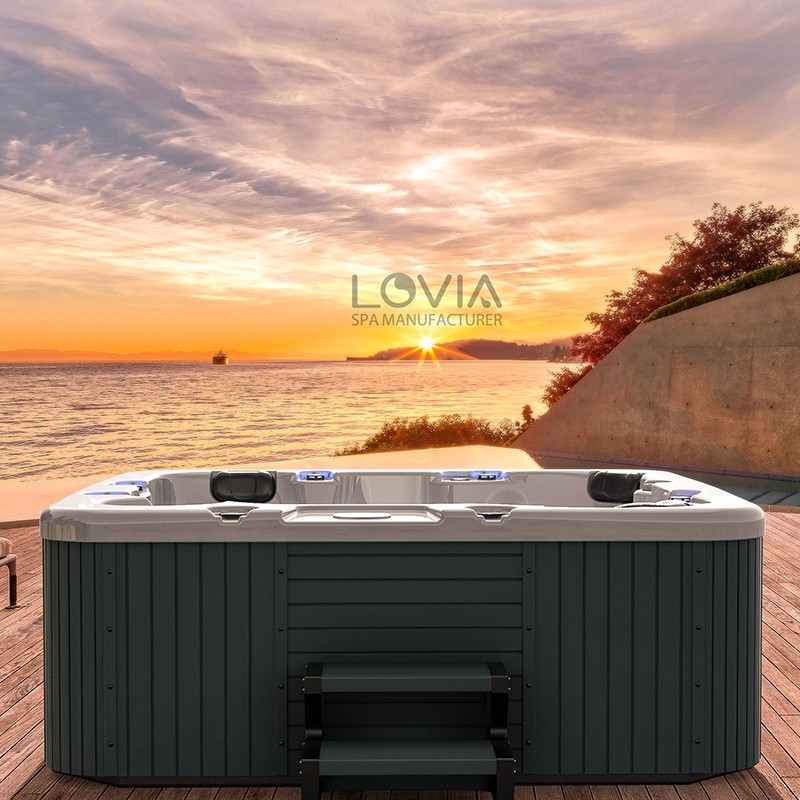
Since 1989, Lovia Spa has been a leading manufacturer of outdoor spa jacuzzi bathtubs and swim spas, supplying wholesale and customized solutions to buyers worldwide. Our 45,000-square-meter factory produces 1,200+ units per month, ensuring fast delivery and high-quality standards. Whether you’re looking for low-price bulk orders, discounted spas, or exclusive quotes, we provide competitive options tailored to meet your business needs. Buy from Lovia Spa today!


